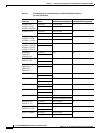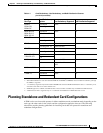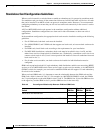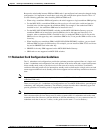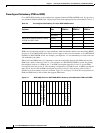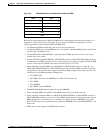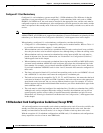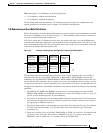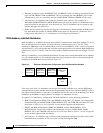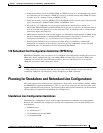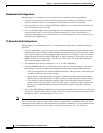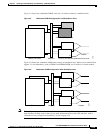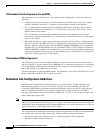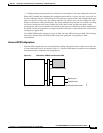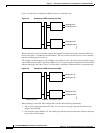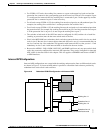
4-10
Cisco MGX 8800/8900 Series Hardware Installation Guide
Releases 2 - 5.2, Part Number OL-4545-01, Rev. H0, May 2006
Chapter 4 Planning for Card Redundancy, Line Redundancy, and Bulk Distribution
Planning Standalone and Redundant Card Configurations
• When the secondary card is an MPSM-8-T1E1, the MPSM-8-T1E1 can back up the following card
types: AUSM, FRSM, CESM and MPSM-8-T1E1. For example, the same MPSM-8-T1E1 could
simultaneously serve as a secondary card for AUSM, FRSM, CESM and MPSM-8-T1E1 cards.
• All cards in a 1:N redundant card set must be installed in the same bay. For example, in a
MGX 8850 (PXM1E/PXM45) or MGX 8850/B switch, all cards in a specific 1:N redundant card set
must be installed in the upper bay or in the lower bay. The 1:N redundant card set cannot be split
between the upper and lower bays.
• SRMs must be installed in each bay that supports 1:N redundancy, and the number of SRMs in that
bay must match the number of installed PXMs and be placed as described in “Standalone Card
Configuration Guidelines” or “1:1 Redundant Card Configuration Guidelines.”
1:N Redundancy with Bulk Distribution
Bulk distribution is an SRM card feature that combines communications paths from multiple T1 or E1
lines on individual service modules and forwards those communications over T3 or OC-3 lines
connected to SRM back cards. Communications received over the SRM T3 or OC-3 lines are separated
into individual T1 or E1 data streams and forwarded to the appropriate service module. Bulk distribution
enables you to use one T3 or OC-3 line for service module communications instead of multiple T1 or E1
lines.
When 1:N redundancy is used with bulk distribution, no back cards are installed behind service modules
in a 1:N redundant card set. All communications lines for the protected cards are rerouted through the
backplane to the SRM back card as shown in Figure 4-4.
Figure 4-4 Example 1:N Redundant Configuration with Bulk Distribution Enabled
If an active card in the 1:N redundant card set fails, the standby card takes over, and the SRM routes
communications from the standby back card to the appropriate logical lines within the SRM T3 or OC-3
line. When bulk distribution is used, the 1:N redundant card set does not use the redundancy bus on the
backplane, so the SRM can support failures in multiple 1:N redundant card sets.
To support a 1:N redundancy configuration with bulk distribution, use the following guidelines:
• SRM T3 configurations (SRM-3T3/C and SRME/B with the BNC-3T3-M back card) support bulk
distribution on 8-port AUSM, FRSM, CESM, MPSM-8-T1E1, and VISM-PR cards that use T1 lines
only. Refer to Table 4-1 to see if a specific service module supports bulk distribution.
• SONET and SDH configurations (SRME and SRME/B with the MGX-SMFIR-1-155 or
MGX-STM1-EL-1 back cards) support bulk distribution on 8-port AUSM, FRSM, CESM,
MPSM-8-T1E1, and VISM-PR cards that use T1 or E1 lines. Refer to Table 4-1 to see if a specific
service module supports bulk distribution.
• All cards in a 1:N redundant card set that uses bulk distribution should not have back cards. When
bulk distribution is enabled, all lines on a card are routed through the SRM.
89878
Primary
CBSM T1/E1
front card
Primary
CBSM T1/E1
front card
Secondary
CBSM T1/E1
front card
SRM front
card
SRM back
card



